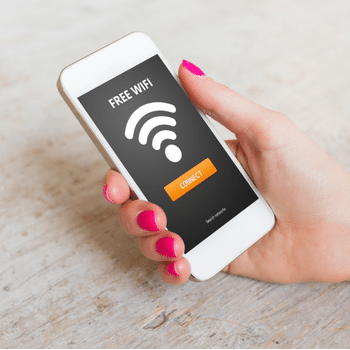Why are public Wi-Fi networks dangerous?
 In recent years, practically all coffee shops, restaurants and stores have begun to offer Wi-Fi to clients. However, this benefit also involves certain risks.
In recent years, practically all coffee shops, restaurants and stores have begun to offer Wi-Fi to clients. However, this benefit also involves certain risks.
As the name suggests, public Wi-Fi networks are those open to the general public. But, contrary to what most people think, these networks may or may not be protected with passwords.
For example, even when a coffee shop requires its clients to insert a password to connect to the network, it’s still a public Wi-Fi network.
As such, remember: it’s not just because a network has a password that it should be considered safe.
What are the risks of public Wi-Fi networks?
-
Man-in-the-middle attack: cybercriminals can position themselves between you and the sites you are accessing. As such, all the information you believe you’re sending to one site, like your username and password, is silently intercepted by a fraudster.
-
Fake Wi-Fi Hotspots: criminals can create fake Wi-Fi hotspots, with names identical to networks offered by establishments. When you connect to them, criminals can access all the data and files you send or download, using them as they please.
-
Infected router: just like our cell phones and computers can be invaded, routers can too. When we use public networks, there is no way of knowing if these establishments have updated software and whether they protect routers effectively. And, when we access contaminated networks, our devices become vulnerable to attacks.
What type of data can be accessed through public Wi-Fi networks?
Using any one of the aforementioned scams, cybercriminals can access all the data that leaves our devices and is sent to other users or any other site, ranging from usernames and passwords to files sent and downloaded.
Additionally, depending on the criminal’s skill and the type of attack, all the files stored on your device become vulnerable.
As such, when connecting to public Wi-Fi networks, we need to take extra care, especially if the devices in question are also used for work, as you could be putting the company’s information security at risk.
Using public Wi-Fi networks with greater security
The truth is there is always a risk involved when connecting to unfamiliar networks. But, when it really is necessary, there are certain steps you can take to ensure a safer connection.
-
Keep your devices and software up to date: this is true for both your antivirus and all the other software and applications you use, like your browser. This will prevent recognized vulnerabilities from being exploited by cybercriminals while you’re connected.
-
Only access sites with an HTTPS protocol: the HTTPS protocol, represented by a closed lock icon alongside the URL, indicates that the communication between the user and website is encrypted. When connected to a public Wi-Fi network, only access websites that feature this protocol, complicating things for cybercriminals hoping to get their hands on your data. When browsing on unencrypted websites, your information becomes extremely vulnerable.
-
Disable automatic connection: by disabling this option, you make sure your devices don’t connect to previous networks again or any other network not protected by a password.
-
Use a VPN: VPNs encrypt all the data that leaves your device.
-
Enable two-factor authentication: with two-factor authentication, even if cybercriminals intercept the connection and capture some of your usernames and passwords, you still have a second layer of protection to secure your accounts.
Conclusion
There will always be risks associated with using public Wi-Fi networks – after all, they’re available to everyone, all the time.
Avoid any type of transaction or online operation that is not strictly necessary at that moment, especially those requiring the entry of personal information – like accessing your bank app or when making online purchases. To keep yourself protected, use your mobile data whenever possible.
Lastly, if connecting to a public Wi-Fi network really is your only option, follow the main security steps recommended in this article. That way, you have a lot better chance of staying protected!
